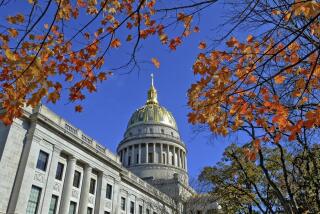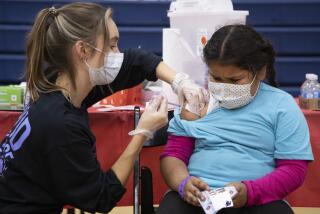California vaccine bill clears Assembly panel despite emotional backlash from parents

Reporting from Sacramento — Following a five-hour hearing in which hundreds of parents spoke in opposition to tightening California’s school immunization requirements, the Assembly Health Committee easily passed a contentious bill Thursday to do just that.
Sobbing parents cradling infants hugged in the hearing room after the 9-2 vote, with a handful of opponents yelling at lawmakers for approving Senate Bill 276.
“I expected this is how they would vote,” said Ciara Mumford of San Diego as tears ran down her cheeks. “It’s really difficult though to watch this many people say horrific things have happened in their family and to have that ignored and disregarded. This is about medical freedom.”
Amendments this week shifted the focus of SB 276 toward sanctioning doctors who improperly issue medical exemptions. The amendments also narrowed when the state would intercede in cases where doctors had allowed children to skip some or all of the vaccinations required to attend school or daycare.
The changes did little to quell massive turnout against the bill, with hundreds of parents lining up to register their opposition as they did during previous hearings on SB 276.
“This law is unprecedented,” said Leigh Dundas of the opposition group Advocates for Physicians’ Rights. “It takes state government and puts it squarely in the center of the doctor-patient relationship.”
The bill next heads to the Assembly Appropriations Committee. Gov. Gavin Newsom said this week that he supports the newly amended SB 276. Several Assembly members said the amendments addressed their concerns with the bill and offered support to the bill’s author, Sen. Richard Pan (D-Sacramento), who has faced fierce criticism and even death threats since introducing the measure.
Many of the parents who spoke in opposition said their children had adverse reactions to vaccines and pleaded with the committee to reject what they called a “fascist,” “unconstitutional” and “ungodly” bill.
California has some of the nation’s tightest childhood vaccination laws, requiring immunizations to attend public or private schools or day care. A doctor can excuse a child, either temporarily or permanently, from some or all vaccinations if there is a medical reason. However, in recent months several lawmakers have alleged that some doctors are improperly approving exemptions.
Under SB 276, the California Department of Public Health would review and potentially reject any child’s medical exemption if they attend a school or day care with immunization rates of less than 95%. Approximately 20% of schools and day cares would currently fall under that scrutiny.
The department would also review medical exemptions written by doctors who have granted five or more in a year.
“We want to keep kids safe in school,” said Pan. “We want to give as much latitude as possible, while recognizing that every exemption we give, we are also weakening the community immunity in the school.”
The bill sets new guidelines on what medical conditions qualify for a vaccine waiver, a restriction proposed in response to reports that some doctors were excusing children for questionable reasons such as having asthma or diabetes. Pan said unneeded vaccine exemptions place children at risk, including those too young to be immunized or those with medical conditions, such as undergoing cancer treatment.
Opponents of the bill say the new guidelines are too narrow and will force parents whose children had reactions not severe enough to warrant a waiver to decide between vaccinating their child or homeschooling them.
“This bill will scare doctors away from writing medical exemptions for children who need them,” said Dr. Bob Sears, an Orange County pediatrician well-known for criticizing vaccine bills.
Sears is the only California doctor to be sanctioned by the Medical Board of California for improperly writing a medical exemption for vaccines. Despite being placed on probation by the medical board, Sears continues to write medical exemptions — including for a child in the San Francisco Bay Area, as reported in a recent San Jose Mercury News story.
Pan held Sears up as an example that the system is not working, telling his fellow lawmakers that SB 276 would ensure doctors under investigation could not write new medical exemptions.
Under the bill, the state would have the authority to bar certain doctors from writing medical exemptions for up to two years if the health department determines they pose a risk to public health. The state would track all rejected medical exemptions and share that information with medical licensing boards.
Doctors would have to certify, under penalty of perjury, that the medical exemption they sign is accurate and, along with parents, would have to agree to release any related health records to support their claims. Those records would help the Medical Board of California investigate doctors who write fraudulent medical exemptions.
“We witnessed physicians who advertised exemptions for cash on social media and the internet,” Pan said. “Some parents would post that their child’s physician refused to grant their child a medical exemption, so they bought one from a distant physician.”
Supporters were far outnumbered at the hearing, despite public health advocates urging tougher immunization laws and a recent poll reporting that 3 of 4 Californians support stronger requirements on vaccine exemptions.
Pan introduced the bill amid a national measles outbreak, in which more than 1,000 Americans have been infected. The bill is supported by the California Medical Association, the lobbying arm of doctors in the state.
Anti-vaccination advocate Robert F. Kennedy Jr. attended the hearing, a week after he lobbied the Legislature with actress Jessica Biel. On Thursday, actress Kristen Bell and her actor husband actor Dax Shepard logged their support of the bill on Twitter.
Follow @MelodyGutierrez on Twitter and sign up for our Essential Politics newsletter.
More to Read
Get the L.A. Times Politics newsletter
Deeply reported insights into legislation, politics and policy from Sacramento, Washington and beyond. In your inbox three times per week.
You may occasionally receive promotional content from the Los Angeles Times.











